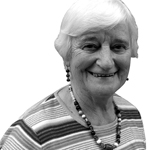On the pilgrim way: ‘Shetland’s beauty is sheer gift’ - Reform Magazine
Sheila Maxey discovers Shetland’s gifts
 We are on the Shetland islands. Our holiday house looks down a voe (small bay/creek) past a little pier, through the gap in the bare hills to further shores or islands. The sun sets in the gap between the hills. We are part of a tiny cluster of buildings, one of which is a bakery – not a shop but a place where bread is baked and sent around the area. In the morning, I go in a side door and buy rolls, or bread, or a sausage roll for our picnic. Once or twice, a seal has poked its head up near the pier. It is a wonderful place.
We are on the Shetland islands. Our holiday house looks down a voe (small bay/creek) past a little pier, through the gap in the bare hills to further shores or islands. The sun sets in the gap between the hills. We are part of a tiny cluster of buildings, one of which is a bakery – not a shop but a place where bread is baked and sent around the area. In the morning, I go in a side door and buy rolls, or bread, or a sausage roll for our picnic. Once or twice, a seal has poked its head up near the pier. It is a wonderful place.
Shetland does not go in for villages. A few widely scattered houses with a public hall among them, and perhaps an old church, constitutes a community. It is not clear to visitors where places start and finish. In between places are miles and miles of peaty moorland, almost always within sight of the sea. But community spirit is strong. We drove far north on one of the islands and, at the end of the single-track road, found houses, a school and – most surprisingly – a beautiful community garden. The garden had a good stone wall to keep rabbits out and to provide shelter for the plants from the endless wind.
We drove far west to the soaring cliffs of Eshaness and found a museum which exhibited Northmavine bridal dresses worn during most of the 20th century. We drove in pouring rain, one Sunday, through Ollaberry and found it was their day for ‘Sunday tea’. Throughout the year, different communities host Sunday tea and people come from far and wide to sample the baking. The spread of cakes and savouries was amazing. We sat with a farmer who had driven up with his wife from the island of Bressay, just because Ollaberry’s Sunday tea was the best!
We drove in glorious sunshine along a single-track road to the oldest church in Shetland, standing all alone, overlooking the sea. It is always open, and a local woman told us they had fortnightly services with a congregation of six. We parked and just sat for ages, watching the occasional boat, and the various islands fading into the distance.
We had terribly sad family news soon after we got here, and took the difficult decision to stay here and just return in time for the funeral. We phone our son every day. Our scattered family is connected by texts and phone calls. Perhaps the busyness of home would have given us the illusion of usefulness. Here, we are helpless but we have time and space. The austere beauty of this place is sheer gift. Thank you, God.
Sheila Maxey is Book Reviews Editor for Reform
___
This article was published in the October 2018 edition of Reform











Submit a Comment